Alex Bledsoe's Blog, page 28
March 19, 2012
Interview: Red Reaper director Kristen Stewart
The Legend of the Red Reaper is a project I've been following for a while. I first saw the temp trailer a couple of years ago, and was impressed by the fact that the actress playing the main character, Tara Cardinal, looked not like some superpowered pixie waif but like a woman who could legitimately kick ass:
Since at the time I was planning to introduce a tough female sidekick for Eddie LaCrosse, this got my attention. (You can see my creation, Jane Argo, this summer when Wake of the Bloody Angel hits stores.)
Now, with Legend of the Red Reaper near completion, director/screenwriter Kristen "Stew" Stewart (not the Twilight actress, it should be clear) was kind enough to answer some questions about the film, and about being a woman creating an action heroine.
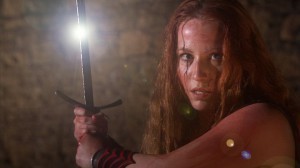
Actress Tara Cardinal as the Red Reaper.
Me: You created the Red Reaper character for actress Tara Cardinal. What did you want this character to say and represent?
Kristen: I wanted to create a superhero that happened to be female. When we first starting pitching the concept of the "Red Reaper" to production companies, they immediately thought of a man playing the role. I wrote her like a man. I'm constantly irritated by gender stereotypes–they just don't apply in the superhero world.
Aella, aka the Red Reaper, is a dark hero. She's tortured by her desire to follow her dreams and her duty to the people of her realm. She's very much an outcast. We see throughout the course of the film that she's special–and most people don't like "special." They're afraid of her, hate her, torture her, and she responds by becoming harder, stronger and calloused. In the end she chooses duty over love and pledges her life to help the people who still fail to understand, or even like her.
Ironically, I think everyone can relate to feeling isolated. I wanted to create a character that could see past her own pain and use her special abilities to make the world a better place, even for the people who hate her.
What aspect of writing the script was most difficult: creating the background of the world, the actual story or the characters? And how did you address that difficulty?
My process was entirely backwards, and I can't take full credit for the writing. I was helped by MANY people along the way, and while I may not mention them by name, I'm very grateful for their guidance. The original screenplay was written by Kim Pritekel (based on my concepts), and had a simple, easy to follow plot about some Reapers, some humans, and the demons out to destroy them. Through a series of unfortunate events after shooting a little more than half the film, production was delayed for two and half years. During that time the original producers, director, and Kim had all moved on to other projects, and the money was tight. I stepped back in with the extremely limited resources and re-wrote the script with the parameters of only being able to use certain available cast, location, and equipment. It was like playing Sudoku, but much harder. So, really, I only created SOME of the characters, and then added some quirks and twists to the other existing ones. The created world became a product of necessity, and thus created itself. I'm hard pressed to take credit for that.
My writing process is a wonderful experience for me. I sit, or shower, or walk, and imagine the world and the characters, and once I know what they want, I let them show me how they're going to get it. I don't feel like I wrote Legend of the Red Reaper, I feel like it wrote itself, and I just transcribed it. I have no formal training in screenwriting, so for me, the hardest part was learning the formatting. After that the film re-wrote itself.
Women-created action heroines are common in prose genres such as urban fantasy, but not so much in the movies, where they're usually created and developed by male writers. What did you find most difficult about your conception of the character and her story, to get across to the men who worked on it with you?
Oh, now THERE'S a great question! In the original version of the script, which had a lot of input from a male exec, the Red Reaper cried throughout the film. She cried because she loved her boyfriend, she cried when she didn't get what she wanted, she whined at her father, she pouted and stamped her little feet. It drove me NUTS. The average woman isn't that whiny; why is this superhero acting like a spoiled brat? Better still, in many of the battle sequences she required the aide of a man–usually not even a Reaper man, but a human man. Even at the end, the Red Reaper is defeated by the Big Bad and her human boyfriend comes in and saves her. It's like Lois Lane taking out Lex Luther! It's asinine. Asinine or not, it's really not all that uncommon when it comes to female characters in general.
It irritated me so much that I went as far in the opposite direction from that as I could. I made the Red Reaper fairly stoic. You'll find she doesn't have a lot of dialogue throughout the film: she's a man of action, not words. There is a love story, but her role is the more masculine one. The prince is in love with her, but she refuses to say it back to him. She's arrogant, violent, brash. She's confrontational, she talks with her mouth full and she would never hit a woman. She's gallant and brave, chivalrous even. I never once thought of her as a woman when I re-wrote the script. Only as a hero.
I was lucky that during the last round of filming I had a great crew: my DP, my first AD, my head of Make up and SFX and my associate producers were all men very comfortable and secure with themselves. They never once questioned my leadership, my vision or my dedication to the film, and never once treated me or the character like a woman.
Thanks to Stew for answering my questions. You can keep up with Legend of the Red Reaper at the movie's Facebook page.
March 18, 2012
Guest blog: Alyxandra Harvey
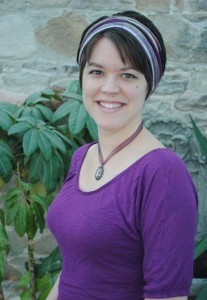
Alyxandra Harvey
Alyxandra Harvey is the author of numerous YA paranormal books, including the ongoing Drake Chronicles. Here she talks about some aspects of her chosen genre and how she relates to her fans.
*****
First, an apology.
I'm sorry if I've become homework.
And I'm sorry if part of me finds that pretty freaking cool.
I get many requests for help on school assignments. Unfortunately, I'm rarely able to answer them— not because I don't want to, but because when it's school project season, I get handfuls of those requests every day. Enough so that I've added a section on my website with the kind of information students might need. I write about vampires, Victorian ghosts, Fae, zombies… that's a lot of ground to cover!
Like all writers, I get asked about the craft.
The bad news is: there's no secret handshake.
The good news is: there's no secret handshake
So, my advice is pretty basic: write. Sounds simple, right? But a lot of people want to be writers— they don't necessarily want to write. If you love to write, you're halfway there already.
Keep at it. Like anything else, you need practice. Learn to finish something: a poem, a short story, a novella. The fire at the beginning of a story can flicker once you're a few chapters in. You can get distracted by shiny idea #15, and that one over there., and wait is that Dean Winchester? Mr. Darcy? (okay those last 2 might just be me!)… so learn to finish. It's a skill like any other.
And because I write vampire YA, I often get asked about Twilight, vampires, and cute boys. When I went on book tour in the UK, I was asked at least once every day if I know Justin Bieber (this is because I'm Canadian. And the answer is no, just in case you're wondering). I also get asked what kind of supernatural creature I would be, which is so much more interesting than your average interview or essay question. And the answer: I would like to be a time traveler. I'm not sure if that counts as a supernatural creature but I'd just really like to visit different periods in history (Regency, Victorian, Ancient Egypt, Iron Age Celts, Middle Ages…) but still come home for my hot shower and ice cream. A girl has to have her priorities, after all.
The really wonderful thing about writing YA fiction is that every so often, I get to travel around visiting libraries and schools. I get to chat with anywhere from 20 to 300 students, all of whom have brilliant insights that would put university lit profs to shame. I am consistently impressed by the calibre of those questions. They make me think about my characters, the reading culture, and writing in general. You are such a brighter star than you think you are. Don't be afraid to ask those questions.
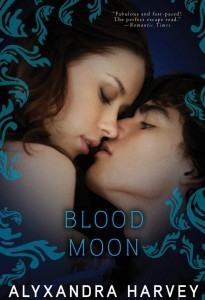
Blood Moon
Another reason I love all those questions? I basically spend my days alone talking to my imaginary friends…and then suddenly on book tour I have to think of interesting things to say to people who actually talk back! So those questions? They save my poor shy writer's brain.
And I usually have questions of my own to ask…Principally, if you could live in a book, which one would it be? (So far, Harry Potter is winning). Discuss.
Oops. That sounds like more homework.
*****
Alyxandra Harvey's books include Haunting Violet, Stolen Away, and most recently, Blood Moon. You can find out more at her website here.
March 14, 2012
Blogging, bullying, and the big pile-on
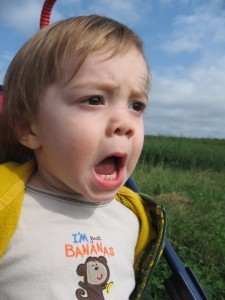
What most bloggers are like on the inside?
In this blog post at Why Advertising Sucks, the author talks–in angry, pithy language–about how quick people on the internet are to criticize. He writes, "People behind a computer are your judges, not knowing you, not knowing your life." That's true, and it's not news. But it got me thinking about the part of it that bothers me the most.
Anyone who's ever been a kid knows about the "pile on," when everyone lines up behind the loudest taunting voice and joins in the derision. It's a subset of bullying, noticeable for the presence in the mocking crowd of previous bullying victims. After all, what better place to hide from subsequent abuse than behind the bully?
Usually those piled-on are the odd ones: the geeks, the nerds, the ones with asthma or thick glasses, the ones clutching a book instead of a football. More cruelly, it could be those with specific physical or mental conditions that make them different. But whoever it is, we sympathize with them, right? No matter who was being picked on, we'd never do that ourselves, would we? We're better than that…aren't we?
Many bloggers, like me, identify with the political left, and some frequently take to the keyboard to berate the right's latest perceived misstep. These bloggers are preaching to the choir just as much as Michelle Malkin or Matt Drudge, setting themselves up as the standard-bearers for causes with which they know their followers already sympathize. Their intentions may be good, even noble; but in practice they're the loudmouths, pointing and laughing.
And this leads directly to the pile-on, as these fans, followers and commentators rush to join the bloggers in being the most offended by whatever (or whoever) the topic at hand might be. Often, the people most offended have, as they say, no dog in the fight. They simply enjoy being part of the pile. The author of the above blog post calls them, "mean, selfish, egocentric douches who decided that the hipster thing to do was criticize the shit out of people."
And it's bullying. The only difference? People are running to the pile from the left instead of the right. And if you've ever been bullied, ever been piled on, you should really stop a moment and think about what you're doing, and what it says about you. Forget who the target is, and look at yourself. Is this who you want to be? Are you really no better than this?
The blogosphere in general is about as mature as the average middle school recess. When people post about current events, it's often with the same emotional motivation as that playground chest-poke that leads to a fight. It doesn't matter if the bloggers are parents or grandparents; anyone of any age can be immature. I know I can. But I try very hard not to be. And more to the point, I've been piled-on in real life. I have no desire to do it to anyone else, no matter what the provocation, because that reduces me to the level of a bully.
So while I certainly share the outrage at recent statements and events, and support those who promote positive change as opposed to just criticizing, I have no interest in joining the pile-on. I've got too many memories of being the kid at the bottom of the pile.
March 5, 2012
Guest blog: the resurrection of Wonder Woman
Ever since working on an essay for a subsequently-cancelled SmartPop collection, I've been fascinated with attitudes toward Wonder Woman. My friend Elizabeth Keathley, a much more well-read and long-term fan, was kind enough to write about the character's recent history.
*****
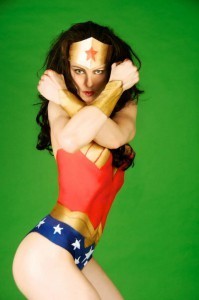
Adele Kirby as WW. Photo (c) 2012 by Sean O'Malley. Body paint by Natasha Bloom (links below)
I have two daughters, ages three and five. When I was around their ages, I wore through more than one set of Wonder Woman underoos, and I don't just mean that I outgrew them. I was forbidden to play with string after cutting off one of my mom's gold-tone window shade pulls for lasso action. I once got in a kindergarten shoving match on the bus because my neighbor Michael Garber tried to tell me The Dukes of Hazzard could beat Wonder Woman. When I was 26, I emailed another childhood friend, Virgil Pool, with a scan of a page from Wonder Woman 175, where she won a fight against Superman. The text of my email? "You owe me a billion dollars from a bet in 3rd grade".
Virgil is now an executive with the South's largest banking firm. I work in Digital Asset Management for a large multinational concern. We keep in touch, because once a love of comics really takes root with a child, it never fully disappears. When we do see each other, we catch up on comics gossip, and of course last year that meant talking about the digital re-launch of DC comics.
Periodically DC and Marvel – the two big superhero houses of American comics – "relaunch" their titles, starting the cover numbering over at 1, and changing things up. Teams get shuffled, costumes and hairstyles updated, personalities shift. These relaunches are ostensibly done to give new readers an entry point to the long and convoluted storylines of the comic book world. It is also true that any book with the number one on it tends to sell a little bit better than average, and that really counts today, when the number of regular comic book readers is estimated to be somewhere around just 250,000 individuals.
When there are more choices than DC and Marvel, the writing and art must be top-notch to keep up readership. Given this tough market, in the past decade Marvel decided to invest in great writers, and for the first time did things that made me want to read Daredevil and even take a peek back at the X-men. DC went a different route. They gave their head editor position to Dan Didio, and he decided that the problem with DC comics was that they weren't catering enough to young men. He wanted to make DC edgier and sexier. He did, and women fans (including myself) fell away in droves, some going so far as to start up protest sites like Girl-Wonder.org. Why protest a shift in comic book editorial policy? You can read more about that over on Girl Wonder, but basically Didio decided that appealing to younger men meant a rape storyline, some art many consider to be torture porn, and the death or demotion of most of the main female heroines of the DC universe.
So another DC comics relaunch, this time with a digital component focused on the iPad market, excited me. At last, I thought, Time/Warner is going to lay down the profit law on DC comics. The animated TV series have audiences in the millions, and remain so popular that Cartoon Network plans to soon launch a new programming block around DC comics characters. I had hoped – as had many others with children, I like to think – that the digital relaunch would align the comic book Wonder Woman and Supergirl with the cartoon Wonder Woman and Supergirl.
Alas, under Dan Didio's editorial vision, the new Supergirl comes with crotch snaps.
I would like for my daughters to learn to love reading comics. I have given them copies of Little Lit and reprints of Uncle Scrooge and copies of Asterix that my husband picked up in Europe as a child. My oldest picked up Mouse Guard from our shelf and read it on her own, along with a little of Bone. Until recently I had settled on the fact that while my daughters will learn to love comics, it won't be the superhero comics that I read as a child. I was a little sad that Supergirl and Wonder Woman were destined to be second-string cartoon characters to them.
I was surprised when my friend Elle excitedly emailed a recommendation that I read the first four issues of the new run of Wonder Woman. The new run written by Brian Azzarello calls back to the work of Greg Rucka in 2003 by re-instituting a Greek Gods storyline. While Rucka's quest-for-father storyline centered on Cassie – Wonder Girl – Azzarello puts Diana square in the middle of the Joseph Campbell cliché. The art by Cliff Chang gives us lots of close-ups, but thankfully gone is the cheesecake soft-core porn that sometimes made me embarrassed to buy the title in the past. There's still plenty of comic-book violence, and even a make-out scene in issue three, but I wouldn't have a problem handing these comics to a ten-year-old girl to read.
I will continue to borrow Wonder Woman issues from my friends for now, swapping them for volumes from the library of graphic novels I've built up since the fall of 2004. If Wonder Woman continues to be a readable, fun book, I might just go back to buying monthly issues again – this time on the iPad. If the story stays well written – and doesn't echo much of the Jill Presto arc of Lucifer – maybe one day I'll even share the files with my daughters. I still think that the cartoon versions of the DCU characters are better written and produced right now, but when you're a Wonder Woman fan, you take what you can get – and just pray the artist remembers to cover Wonder Woman's crotch.
*****
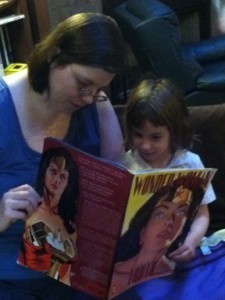
Elizabeth Ferguson Keathley has been reading comics since she could read, and engaging publicly about them since a fight in third grade. She has appeared as the feminist guest speaker on a couple of podcasts
over at Fortress of Baileytude, but mostly specializes in showing up at DragonCon panels and asking questions. In her professional life, Elizabeth works with Digital Asset Management (DAM) systems, and is chair of the DAM Foundation HR & Talent committee. Elizabeth swore off single-issue comics six years ago and instead has too many shelves of graphic novels.
*****
Adele Kirby: http://www.adelekirby.com/
Natasha Bloom: http://www.natashamakeup.com/
March 4, 2012
International Eddie
Here's the German cover art for The Sword-Edged Blonde; the title translates as The King's Sword, which is a reasonably accurate alternate title (and definitely looks cool in German). Available in Germany April 9!
This actually does look a lot like I envisioned the younger Eddie from the flashback scenes. And here's an exclusive tidbit you'll only find here: Young Eddie will also appear in the fifth novel, so far untitled, so far only about half written, but coming out in 2013.
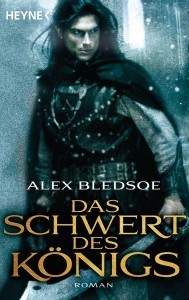
Das Schwert des Koenigs
February 28, 2012
Burn Me Deadly paperback, Wake of the Bloody Angel teaser
Today the mass market paperback of Burn Me Deadly, with new cover art by Larry Rostant, hits stores. It also includes the first three chapters (how's THAT for a tease?) of my next Eddie LaCrosse book, Wake of the Bloody Angel. And to celebrate that, here's the teaser trailer for the new book, to give you a little taste of what's in store this summer.
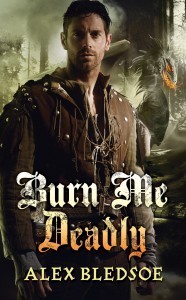
new in paperback!
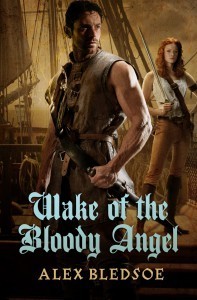
Coming this summer!
February 27, 2012
5 Things Not to Say to a Writer's Wife
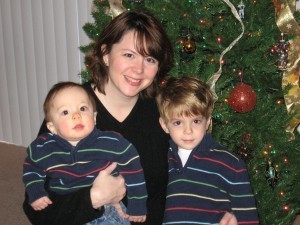
Valette with the C-in-C and the Squirrel Boy
I've written many times, on this and other blogs, about the challenges of being a full-time writer and stay-at-home parent. I've alluded to the difficulty of living with someone like me, but of course I can never truly know what it's like. My wife, however, knows exactly what living with a writer is like, and in this post she talks about it. Thanks to Valette Piper-Bledsoe for writing the following.
*****
I've read plaintive blog posts about the writer's life–the struggle to find productive creative time, the conflicting demands of family and work, the siren call of YouTube or solitaire. All perfectly valid, of course. I live with a writer, and I see that it's a calling as much as anything else–something one does because one must and not necessarily because it's glamorous or fun.
But it's no picnic being a writer's wife, either.* If you happen to meet one, here are a few things not to say:
1. You must work because you really like your job, because writers make soooo much money.
Hah, hah, hee, ha, snort…sorry. While I like my job and happen to be good at it, I work because we need two incomes. It's a sad reality that most writers–the vast majority, I'd venture to say–are not rich. The number of fiction writers who can support themselves and their families solely on their writing income is probably very, very small. My job also provides benefits such as health insurance, dental and vision care, and pension contributions. Even the most successful writers must fund those (and pay taxes) themselves. Of course, if you're Stephen King, John Grisham or Nora Roberts, I don't think that's much of an issue for you. Most writers–even the ones who make a living at it–aren't in that league.
2. Oh, you poor thing, having to support your husband.
Conversely, those who don't assume we're rich, assume that "writer" is code for unemployable bum. Nothing could be further from the truth. My husband works, and works hard. Writing is his job, and he takes it seriously, approaching it with immense discipline. Writing isn't just staring out the window or at a computer screen, thinking deep thoughts (even if that's sometimes what it looks like). Like any creative labor, it requires a great deal of energy, time and dedication. Most mid-list writers these days can add "marketer" and "publicist" to their job duties. Writing good books isn't enough–you need to blog and tweet, maintain a Facebook page, make the rounds at conventions, and in general put yourself out there. In my husband's case, he does all of this, writes amazing books, and takes care of our two small children. Hell yes, I support him; I applaud him.
3. I don't really like science fiction or fantasy, but I'll guess I'll read your husband's book if you give me one.
If my mother–the woman who endured 48 hours of anesthesia-free labor to bring me into this world–can buy my husband's books, so can you. Especially if you're so worried about my family's financial state (see #2). Publishing is a business. Great critical reviews and awards are nice, but the bottom line is sales. So go buy a damn book. Hardcover is super, paperback or e-reader is lovely. If you're struggling, go to a library and ask them to order a copy. It all adds up. Don't think someone else is going to buy a book. Sales matter. My children and I thank you.
4. I've always wanted to write a book! Can your husband recommend me to his agent/publisher?
Alex has always been generous with his time and experience, helping beginning writers through workshops and speaking to local students. He remembers what it was like starting out. He can tell you how he did it, how to find an agent, give you tips on how to write an agent pitch. But no, he's not going to recommend you to his agent–who is a lovely person, a good agent and has a perfectly good website with information about the kind of submissions she's looking for. First, you might want to actually write that book. I bet you find it's a lot harder than you think (see #2).
5. Oh writers, aren't they all … depressed, alcoholic, crazy, fill-in-the-blank.
While I'll admit that a cliche exists around creative types for a reason, just because someone is a writer doesn't mean they're nuts. All writers are not Ernst Hemingway. Or Hunter S. Thompson. Or Sylvia Plath. Or…okay, so there are a lot of examples. Anyway, not all writers are drunk, crazy or suicidal. Alex happens to be a funny, sweet person–a wonderful husband and father. Many other writers we know are also kind, funny, happy, normal people, no more likely to down a fifth of Scotch or kick their dogs than your average doctor, lawyer or computer programmer. They're writers, not musicians, for Pete's sake (just kidding).
Not that living with a writer is all sunshine and roses. There's the staring into space during dinner as they process a plot point, the sudden rush to the laptop because they thought of a perfect line for a character, the pouting because they have to go on a family outing instead of editing, the sudden influx of say, books about pirates…
But that's a different post.
Valette, proud to be a writer's wife
* I say wife because I am one, but spouse works just as well, I should think.
February 22, 2012
Guest blog: Jennifer Lambe on picking guests of honor
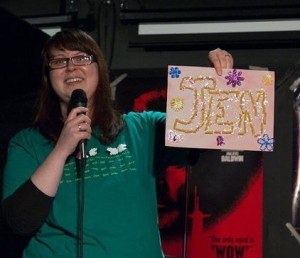
Jennifer Lambe of Hal-Con.
Hal-Con, in Halifax, Nova Scotia. Since it's my first GoH gig, I've asked Hal-Con's lead organizer, Jennifer Lambe, to talk about the process of picking GoHs. Jennifer says she is "a community organizer by nature; working as a Fund Development Officer for a charity by day, and running a sci-fi convention by night. In between those two big jobs, she also runs her own event company, volunteers for Steve Jackson Games as a game demonstrator, and tries to have a life sometimes too."
*****
The process of picking guests for a convention varies. Some organizers might use a well thought-out plan of timing author appearances with releases of the movie versions of their novels (oh, to have Tolkien nowadays!) that coincides with the convention dates. Some might scout novelists that live in close proximity to the host city, or perhaps are easily brought in by one direct flight. No doubt, booking the latest bestselling author is a sound rationale for choosing a guest.
While those are well-established, reasonable methods, I choose to find authors who are personable, and who also happen to have a varied library of accomplished works. Regardless of whether the author is a horror, science fiction, or fantasy writer, if they are going to appear at Hal-Con, they need to be a person who enjoys meeting fans.
I've been to loads of conventions, conferences, meet-ups and other things. I try to remember back to my worst experiences and work toward providing an environment that will not allow those same things to happen to others.
While getting caught up on my mandatory reading for Geek 101, I've been introduced to some phenomenal authors. Some of those authors are active on the circuit, so I use the internet to hunt down contact information and reach out to the author or their agent. Once contact is established, I try to chat up the author whenever possible, to get a sense of whether they are "all business" or really have fun at conventions. Ideally, it's a mix of the two.
What makes a convention great, as a fan, is the experiences you have while you're there. For some, that might mean meeting your favourite actor, or comic book artist, or having a great conversation with somebody you never met before. It's the connections you make that can change a convention from being "okay" to "AMAZING!"
Hal-Con, the largest science fiction, fantasy, comic, and everything genre convention in the Canadian Maritimes is fan-run and focused on being part of the community at large. As we aren't responsible to deliver a monstrous yearly surplus or providing our shareholders a return on their investment – we have the creative freedom to take a difference approach on how our convention is run. Hal-Con wants to find great guests (actors, comic artists, and authors) to bring to Halifax, Nova Scotia to "hang out" with the community that makes up the 5000+ geeks and nerds who attend annually. For the people attending, they're invited into a "kitchen party" with all their closest friends for a weekend.
Finding guests who really groove on conventions is a key to success, in my opinion. So many of the negative convention experiences you find on the internet are directly tied to a guest being a jerk to somebody. It's miserable to spend hard-earned money on something you expect to be great – only to be let down. I never want to have a(nother) experience like that – and as the lead organizer / talent director, I can do something about it.
Thanks to Jennifer for taking the time to write this, and if you're in the Halifax area this fall, I hope to see you at Hal-Con!
February 17, 2012
Twilight vs Harry Potter: Leaving Space
This was recently posted on the website Learn from my Fail:
"I got into an argument with this at school. She was of the opinion that Twilight was better than Harry Potter. Her reasoning? Harry Potter's characters had too much personality, while Twilight's characters were blank and boring enough that she could put herself in their places."

Space available?
Now, before you say anything snarky, consider this, from best-selling (and in my opinion, genius) writer Elmore Leonard. In his ten rules for writing, number eight is:
"Avoid detailed descriptions of characters, which Steinbeck covered. In Ernest Hemingway's 'Hills Like White Elephants', what do the 'American and the girl with him' look like? 'She had taken off her hat and put it on the table.' That's the only reference to a physical description in the story."
Now, my question is, are we dealing with the same thing?
Because really, the Twilight reader has a valid point, and probably one of the best explanations for Stephanie Meyer's success despite the critical drubbing she's taken from the literary establishment. Her characters are so basic, so lacking in the details of what we normally consider personality, that it probably is easy to insert your own personality in their place. Writing classes and most professional writers would call this "bad," but is it something from which the rest of us ostensibly "good" writers could benefit?
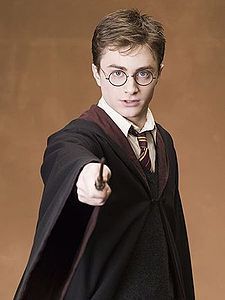
Excessive complexity?
I confess, allowing readers to insert their own personalities into my characters is not a priority in my writing. I try to make my characters believable, understandable, and interesting; if I get that right, I assume readers will be able to both sympathize and empathize, which are similar but not quite the same thing as inserting yourself into the story. If anything, I (and scads of other writers, all less successful than Stephanie Meyer) try to make our characters as detailed as possible, if not physically than certainly psychologically. One of my favorite writing comments, by director/screenwriter David Koepp, is (and I'm paraphrasing) that the more specific we make a character, the easier it is for the reader/viewer to see the universal aspects of it.
So are we going about this all wrong? Are we not leaving enough space for the reader?
I don't think so, but then again, I wouldn't, would I? What do you think?
February 8, 2012
At Apex magazine: No Mortals Allowed
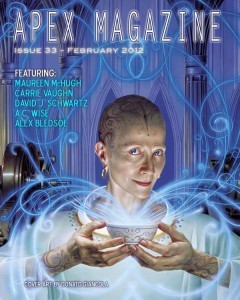
Apex magazine #33.
Over at Apex magazine, you can check out my article on vampire and werewolf secret societies, "No Mortals Allowed." Leave a comment there if you like it!



